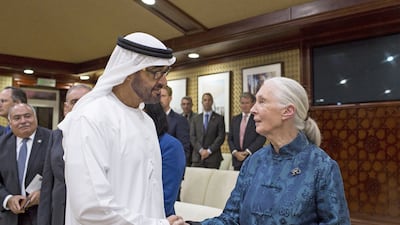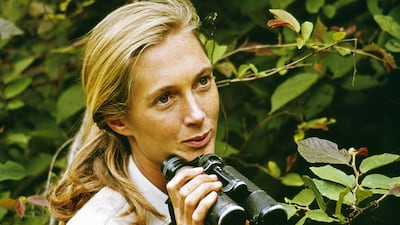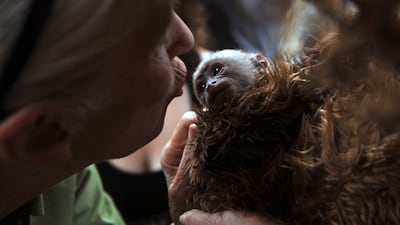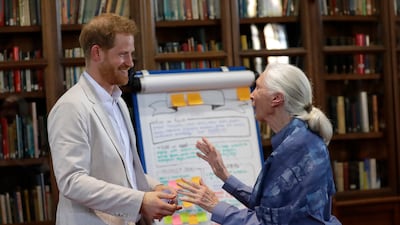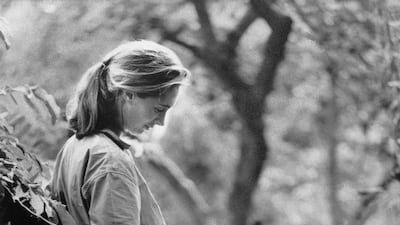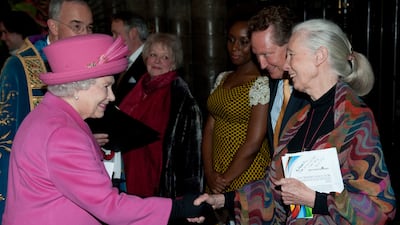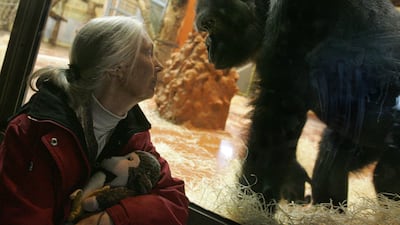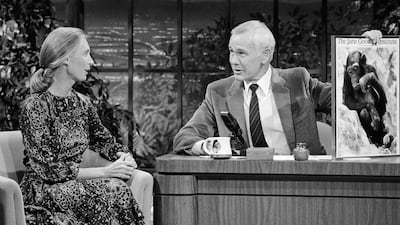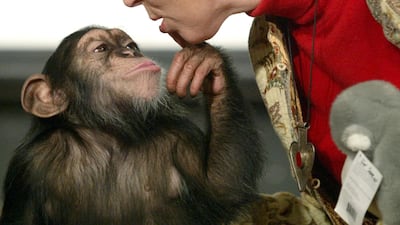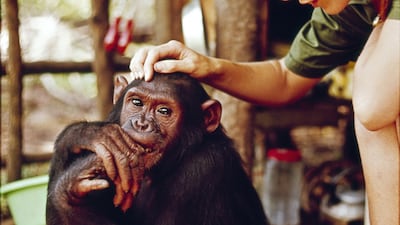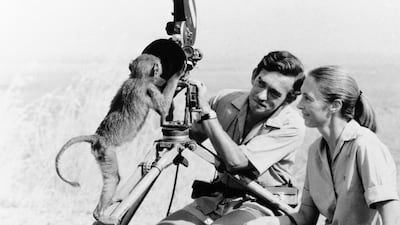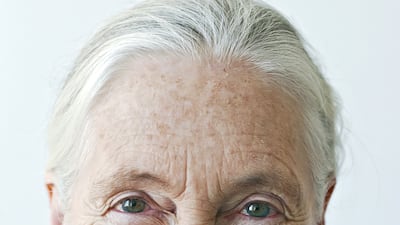She is an internationally renowned conservationist. So when Dr Jane Goodall speaks, the world listens.
And now, in an interview with The National, she has issued a call to the world’s youth: seize the chance to change the course of history.
The acclaimed scientist, whose work in Gombe National Park in Tanzania 60 years ago shaped our understanding of apes, said the world is at a crossroads in how it views critical relationships between nature and humankind.
Since 1991, Dr Goodall’s Roots & Shoots environmental education programme has encouraged children to bring in positive change for people, animals and the environment.
The first intake from schools across Tanzania have held on to those values and are now in positions to make decisions, she said.
“Once young people get involved [with conservation] they become really passionate and are empowered to take action,” Dr Goodall told The National.
“So they can make a difference in trying to make the world a better place.
“They understand we must do something about climate change, the loss of biodiversity, human population growth, poverty, greed and corruption, and when they get together with their peers, they can make a huge difference.
“People lose hope and think they can’t do anything to change the world, but they can.
“If they look at what is happening near them, they can gather their friends to make a difference.”
Traffic, the global wildlife trade monitoring network, said a five-year evaluation showed progress in tackling biodiversity challenges.
In that time, new policies and strategies brought in around the world addressed corruption risks and associated illicit financial flows of wildlife crime.
Initiatives included a guide offered to banks to identify suspicious transactions of wildlife trade, estimated to be worth about $23 billion a year.
Dire consequences of wildlife trafficking
The illicit trade, with the rise of social media fuelling transactions, has threatened the future of species such as the pangolin, African rhino and elephant, cheetahs and tigers.
Despite progress in wildlife protection, illegal trafficking and the destruction of natural habitats still posed significant risks to animals and human health, Dr Goodall said.
“The treatment of animals, and in particular wildlife trafficking, is a huge problem,” she said.
“It is understood that the Covid-19 pandemic was a result of animals being transported around the world and sold in a wildlife market in China.
“Many studies have been done to show diseases can originate when a pathogen or bacteria jumps from an animal to a human.
“If it bonds with a cell in the human body, it can create a new zoonotic disease.
“That is how the current pandemic supposedly began and was then spread around the world.
“It points to the fact that when we move animals around the world, go deeper into their habitats and bring them into our homes, the exotic pet trade is really dangerous.
“Whether is lions, cheetahs, snakes or whatever, that is a risk of developing a new zoonotic disease that cause another pandemic.”
Species saved from the brink
Conservation programmes such as the recovery of the Arabian oryx after its extinction in the wild in the 1970s were singled out for praise by Dr Goodall.
She said the UAE, which was prominent in those efforts, had a significant role to play in leading the conversation on climate change during Cop 28.
The UN climate summit will take place in November and December in the Emirates, and is an opportunity to address shortfalls in previous statements of intent, she said.
“It shows there is more interest in the UAE now than 20 years ago,” said Dr Goodall.
“There have been lots of promises and speeches at great expense [at previous Cops], but they have rarely been followed through.
“Hopefully that is changing. There are passionate people in the UAE government who really care, and their voices will get louder.
“One of the big problems we face is the destruction of biodiversity and habitats, as we greedily consume more and more resources, leaving even more animals threatened by extinction.
“Intensive farming and the way we grow our crops using pesticides and fungicides is killing the soil, which is terrible for biodiversity, insects and birds.
“Huge swathes of land are now used to grow grain to feed animals. It is shocking to think more land is farmed this way to feed animals rather than humans.”
Staunchly committed to the cause
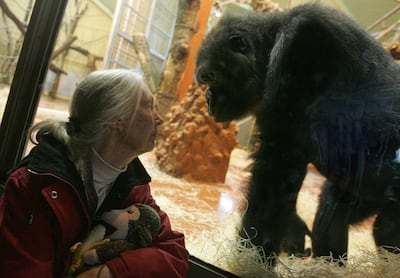
At 88, Dr Goodall shows no sign of slowing down and still regularly travels around the world speaking about climate change and wildlife protection.
She said she would like to be remembered for her successful Roots & Shoots programme.
“Hundreds of thousands of people have been through the programme and it has changed the world,” Dr Goodall said.
“They have respect for each other, animals and the environment.
“Science is beginning to come up innovative solutions, and more groups are working together to preserve forests, habitats, and to clean up the ocean.
“People are now thinking about their own environmental footprint, and nature is so incredibly resilient.
“Give her a chance and nature will come back and take over an area we have totally destroyed while animals have been brought back from the brink of extinction.
“One of my great hopes is the indomitable human spirit — people who tackle the impossible and refuse to give up and so often succeed.
“They come from all walks of life and are inspirational.”











